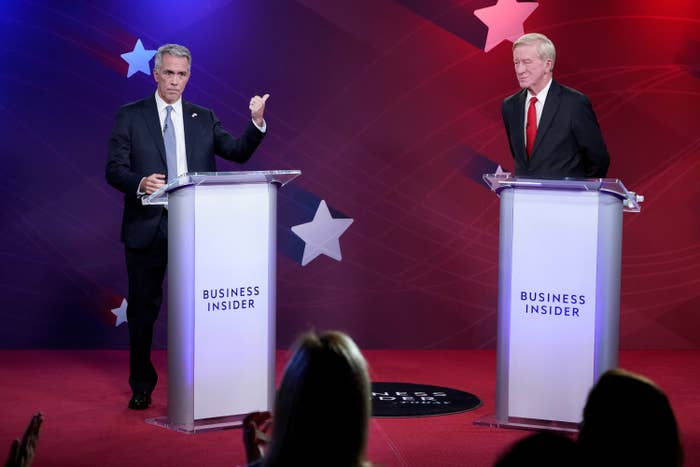
If you were looking for the nerve center of political activity Tuesday, it was not in downtown New York City, where two of the three Republican primary challengers to Trump were debating each other.
Except they weren’t really debating each other. “This is about Trump,” former Illinois representative Joe Walsh said near the beginning of the debate. “I’m not debating Bill Weld. I’ve got all the respect in the world for Bill Weld.”
Though they differed on a few issues, such as whether the US should rejoin the Paris climate agreement, Walsh and his opponent (if that’s the right word), former Massachusetts governor Bill Weld, were broadly in agreement on the most important one of all: that it’s time for Trump to go.
“He deserves to be impeached, and everybody should keep their boots on top of these Republicans so they follow the Constitution,” Walsh said.
“I think the Ukraine caper by the president is some combination of treason, bribery, and other high crimes and misdemeanors,” Weld said, calling it “grounds for removal from office.”
Weld had previously noted in an MSNBC appearance that “the punishment for treason under US code is death.”
Walsh disagreed with this remedy. “With all the respect in the world for my friend Bill Weld, I don’t want Trump hung for treason. I want him impeached,” Walsh said.
“I’ll go with that, I’ll go with that,” Weld added.
Trump’s ouster is the motivating principle of both of their campaigns, and they had plenty of material on Tuesday, after House Speaker Nancy Pelosi announced a formal impeachment inquiry into Trump following revelations that he tried to get Ukraine to investigate the business dealings of Joe Biden’s son Hunter. Trump had been invited to the debate, hosted by Business Insider, but didn’t respond. Former South Carolina governor and representative Mark Sanford, who is also running against Trump, couldn’t make it.
Republicans who oppose Trump are a small minority of their party, and neither Weld nor Walsh (nor Sanford) have a plausible path to the nomination. The fact that several state Republican parties around the country have made it clear they have no intention of holding primaries compounds the difficulty of their candidacies. The debate was small — only about 80 people were in the audience, as well as a small room of about a dozen reporters watching a live feed. (The Democratic primary debates, which have drawn hundreds of reporters, have been held in packed auditoriums.) It didn't air on television, but it was livestreamed online.
Still, the debate served as one of the only public expressions of Republican discontent with Trump this cycle. Though the moderators valiantly tried to get the two to talk about issues, the primacy of Trump in the GOP extends to his opponents, too, and he took up the bulk of the discussion in absentia.
The two come from different Republican traditions: Weld is a centrist New England Republican who has consistently supported same-sex marriage and abortion rights. (“I think all you really need to know abut me is I’m a relaxed, calm person,” Weld said at one point.) Walsh, a former Tea Party representative who used to have a penchant for racist and anti-Muslim tweets, himself admits that he played a part in creating the brand of Republican politics that made a Trump presidency possible.
The problem for both of them is that they, in the hinterlands of Republican politics, don’t represent a meaningful constituency of the Republican Party that wants Trump impeached, because that constituency doesn’t exist — at least for now. Congressional Republicans have largely closed ranks around Trump even as the Democrats begin their inquiry and as the White House released a memorandum on Wednesday of Trump’s call with the Ukrainian president in which Trump asks him to look into Biden. Intra-Republican criticism of Trump has quieted over time to a vague whisper.
As the debate continued, Weld and Walsh continued to bash Trump and the Republican Party for which they’re competing for the nomination. “The Republican brand sucks,” Walsh said. “And it sucks because of [Trump].”
Weld called Trump a “sick man,” a “malignant narcissist,” and a “megalomaniac” with “profound autocratic tendencies.”
Asked about his past behavior, Walsh said, “I helped create Trump. Period.” He had, he said, come to Washington as part of the Tea Party wave, and added, “I engaged in personal hateful rhetoric, some of which I’ve got to live with the rest of my life.”
Possibly the most unexpected moment of the debate came when the live video feed in the press room cut out due to technical difficulties.
Afterward, the candidates took questions for about 10 minutes, with Walsh at one point getting into a contentious exchange with a Guardian reporter over Walsh’s past tweets.
“We’ve had several good talks,” Weld said of Walsh, adding that they had connected over both of them knowing the previous occupant of Walsh’s former House seat. “We’re united by our common assessment of the incumbent in Washington, DC, and the importance of getting him out of there.”
One reporter asked Weld if it was “pointless” to hold a Republican primary debate without Trump there. “You mean shadowboxing? No, it felt like those were real, real punches. It felt great,” Weld said.
